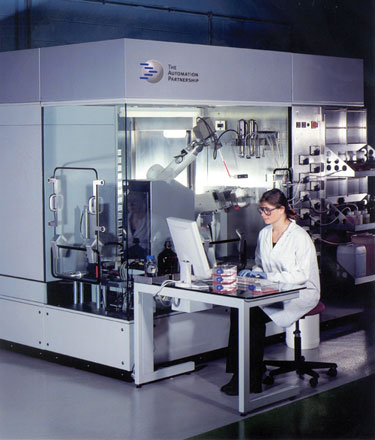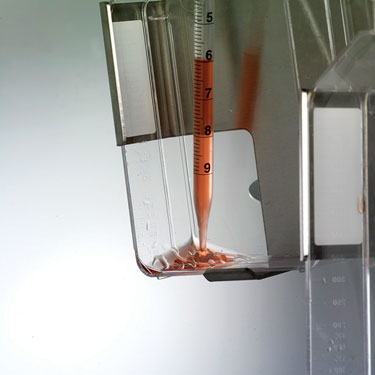December 1, 2009 (Vol. 29, No. 21)
Compound-Management Systems Are No Longer the Company’s Core Business
The official opening of the U.K. Biobank’s purpose-built archive facility for storing the millions of biological samples researchers hope to use to help unravel the genetic and environmental causes of disease took place in July.
The Biobank repository houses The Automation Partnership’s purpose-built Polar™ -80ºC automated sample-management system. The custom system, designed for the storage, automated retrieval, and full tracking of up to 10 million human samples, is the largest of its kind anywhere in the world and will enable Biobank samples to be maintained for 25 years or more, TAP claims.
TAP has experienced a huge evolutionary leap since its origins as an engineering/ automation company focused largely on systems for compound management. “Some 10 years ago, these installations were core to our business and remained so for many years,” explains David Newble, CEO. “Our revenues were dominated largely by sales of huge ‘haystack’ systems—large-scale compound stores required by HTS and uHTS facilities.”

SelecT is TAP’s automated cell culture system for multiple cell lines and assay-ready plate production.
Cell Culture Automation Platforms
More recently, growth in demand for cell-based screening has led to a shift in product focus. “The last five years or so has seen the market for compound storage wane, as most large pharma and other compound-screening facilities already have the systems they need installed,” Newble continues. “Conversely, the market for automated cell culturing platforms has grown and become a significant part of our business, particularly for the screening market.”
Celebrating 20 years of automated cell culture in 2009, TAP sees this field as a major growth driver. The company is building a portfolio of mid-sized cell culture and cell-handling tools, along with consumables and reagents. TAP’s current products in the automated cell culture field include the SelecT™ and smaller CompacT SelecT systems. These automated cell culture and assay-ready plating systems grow cells from multiple cell lines in T-flasks for cell-line maintenance and expansion, and generate assay-ready plates, on demand, for cell-based screening and assay development.
“Things have moved on enormously since we launched our flagship large-volume, single cell-line production system, Cellmate, in 1989. Our aim is to provide a comprehensive range of systems for small- and large-scale laboratory facilities as well as for the cGMP environment,” Newble stresses. “By the end of this year, for example, we hope to launch a completely new benchtop platform for small-scale, suspension culture. At the start of 2009 we also made the decision to act as a distributor of complementary technologies from other manufacturers. As a result, we now market and support Aviso’s automated stem cell picker, CellCelector™, in North America.”
TAP views the field of stem cells and regenerative medicine as a major potential growth driver in the coming years. “In June 2009, we launched a GMP version of CompacT CellBase for the culturing of stem cell and other adherent cell lines. It heralds the first fruits of our continuing R&D for the scale-up of stem cell production. We have already installed a CellBase system in the U.K.’s first contract facility for scale-up of regenerative medicine therapies, at Loughborough University, and are working with FDA and the U.K.’s MHRA to understand exactly how automation fits in with GMP production of stem cells for regenerative therapies.”
Collaborations
In June this year, TAP announced its involvement in the U.K. government-funded RAFT (rapid automated fabrication of tissues) collaboration, with scientists at University College London (UCL). The technology, licensed by TAP from UCL, involves generating complex 3-D tissues by mixing cells with collagen, casting the gel into a mold and compressing it into a sheet.
This structure has properties much like natural tissue and allows the construction of multiple layers with different cell types, TAP claims. Automating the production of tissues will allow the size, shape, thickness, and cell density to be reproducibly controlled to allow the consistent manufacture of tissues for potential therapeutic use, as well as providing a low-cost method of producing tissue models for drug discovery and development.
The three-year RAFT program initially aims to manufacture 3-D human corneal tissue using corneal limbal stem cells, as a means to evaluate whether the technology could be used to produce a range of different tissue types.
The UCL project also complements TAP’s involvement with ESNATS, a European initiative looking at the use of stem cells in drug development, and the Remedi consortium, a U.K.-based group of industry and academic partners, including Cambridge University and Intercytex, researching cost-effective production of stem cell-based therapies. TAP contributes both to the leadership of the overall program and advises on the manufacturing and automation elements of the project.

TAP Quality Assured Pipettes are individually checked during manufacturing.
Advanced Projects Group
Expanding into new areas for automation solutions is the focus of TAP’s advanced projects group, which works to provide novel custom systems for drug discovery, biologics development and production, and sample management.
“The advanced projects group is working on diverse automation projects, ranging from huge biorepositories such as that installed at the U.K. Biobank to low-volume dispensing,” Newble points out.
“We are currently partnering with Cellectricon to develop automation for a new ion-channel screening platform based on novel microfluidic technology. Another collaboration with a major U.K. biotech group aims to develop a high-throughput protein purification system, and our partnership with a DARPA consortium is focused on developing systems for producing red blood cells from stem cells.”
While new projects by the advanced projects group will push the boundaries of automation, both for large-scale and miniaturized cell-related applications, TAP’s partnership services group continues to work with existing clients to maximize value from installed systems, through technical support and engineering services. “One of the roles of the group is to carry out obsolescence management and ensure that stores we have already installed will run for at least another 10 years,” Newble says. “We also carry out related services around our equipment such as decontamination and can support third-party equipment.”
TAP believes that its success combines the benefits of 20 years of state-of-the-art engineering expertise with a strong understanding of biological processes. “Our strengths are in creating the right engineering solutions for different applications. You have to step back and evaluate which parts of a process would benefit from automation before attempting to develop solutions that combine software, hardware, and the integration of additional technologies. This is only possible if you have detailed biological know-how as well as the engineering expertise.”


